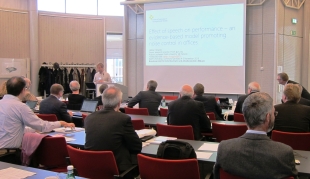Proceedings
The Federal Institute for Occupational Safety and Health (BAuA) hosted an international expert meeting on non-auditory effects of noise at work in November 2015. About 40 invited participants from 10 countries with considerable expertise on different topics in the field attended the meeting.

In general, noise is defined as undesired sound that can lead to various impairments and health effects. It is well-known that high sound pressure levels cause damage to the auditory system (aural effects). The avoidance of these effects is an important task in occupational safety and health. Moreover, high and moderate sound pressure levels can lead to physiological reactions, physical and mental impairments, disturbances in speech communication and to a reduction in work performance. These effects not directly related to the ear are called extra-aural or non-auditory effects of noise. In the light of today's changes in working conditions, the non-auditory effects of noise on employees are gaining more and more importance in the context of safety and health at work.
BAuA hosted a two-day expert meeting managed by the Physical Agents group. The main topics of this event were:
- Non-auditory effects of noise
- Noise in offices
- Noise in hospitals
- Restoration
The first day of the meeting focused on the talks by the invited experts to present the current state of knowledge. On the second day the above issues were examined in detail during several workshops. The key topics of discussion covered knowledge deficits as well as the challenges and opportunities for work system design in practice.
Find below selected presentations given during the meeting for download.
Programme (PDF, 19 KB, Not barrier-free file)
A general survey on non-auditory effects of noise at work places (PDF, 2 MB, Not barrier-free file)
Dr. Helga Sukowski, Federal Institute for Occupational Safety and Health (BAuA), Germany
Noise, stress, and mental health: surveys across different occupations (PDF, 56 KB, Not barrier-free file)
Prof. Dr. Andrew P. Smith, School of Psychology, Cardiff University, United Kingdom
Effect of speech on performance - an evidence-based model promoting noise control in offices (PDF, 468 KB, Not barrier-free file)
Valtteri Hongisto, Finish Institute of Occupational Health (FIOH), Helsinki, Finland
Perception- and effect-related evaluation of open-plan office acoustic design (PDF, 363 KB, Not barrier-free file)
Dr. Andreas Liebl, Fraunhofer Institute for Building Physics (IBP), Stuttgart, Germany
Office noise in real-world offices (PDF, 1 MB, Not barrier-free file)
Prof. Dr. Lukas Windlinger, Zurich University of Applied Sciences (ZHAW), Life Sciences and Facility Management, Wädenswil, Switzerland
Noise control to improve employee satisfaction in offices - What should we measure and how should we promote better design? (PDF, 1 MB, Not barrier-free file)
Valtteri Hongisto, Finish Institute of Occupational Health (FIOH), Helsinki, Finland
Psychoacoustics and health - The importance of psychoacoustics and its relation to noise effects (PDF, 6 MB, Not barrier-free file)
Dr. André Fiebig, HEAD Acoustics, Herzogenrath, Germany
Noise control and forecast in offices (PDF, 1 MB, Not barrier-free file)
Dr. Wolfgang Probst, Datakustik, Greifenberg, Germany
Workplace hospital: Noise as a strain for the medical staff (PDF, 920 KB, Not barrier-free file)
Dr. Gert Notbohm, Institute of Occupational and Social Medicine, Heinrich Heine University, Düsseldorf, Germany
Environmental satisfaction among the personnel in Tampere University Hospital - acoustic perspectives (PDF, 940 KB, Not barrier-free file)
Maija Suokas, Finish Institute of Occupational Health (FIOH), Helsinki, Finland
Acoustics - a major quality parameter in medical interventions (PDF, 6 MB, Not barrier-free file)
Dr. Holger Sauer, Klinikum Westfalen, Lünen, Germany
The effects of sounds on restorative processes (PDF, 880 KB, Not barrier-free file)
Dr. Helena Jahncke, Centre for Musculoskeletal Research, University of Gävle, Schweden
Soundscapes - Nature and Restoration (PDF, 2 MB, Not barrier-free file)
Prof. Dr. Peter Lercher, Medical University of Innsbruck, Austria